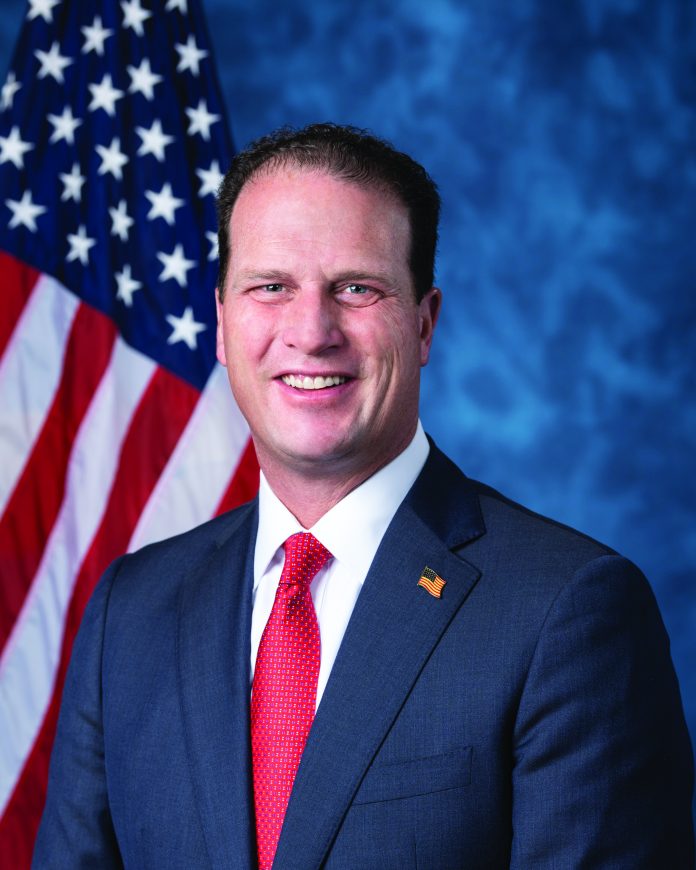Odessa’s U.S. Rep. August Pfluger late Wednesday afternoon from Washington, D.C., said a yes vote tonight on the Fiscal Responsibility Act is critical to both the nation and to the energy industry of the Permian Basin.
Pfluger warns that if Republicans break ranks hoping for a “perfect” bill that it could spell disaster for the country.
“This proposed bill has so much misinformation out there … This bill is a win for West Texas,” Pfluger said adding it is not a victory, but it is a first down.
He said the bill will save $2 trillion over six years and also includes a back to work clause that requires able bodied people to work a minimum of 20 hours a week to get federal benefits.
He said he is thrilled that there is EPA reform in the bill as well as “clawing back $20 to $30 billion in COVID funds that are being used as a slush fund.”
He said the country needs another first down and that this bill is “the big time” and that he hopes those on the far right do not join the 213 Democrats working to kill what he calls a not perfect bill, “now is the time to come together.”
He notes the energy provisions are items he has championed but added it will only take 5 Republicans to kill it.
“Elizabeth Warren called this bad, bad, bad and that is how I know it’s a good bill. We cannot let perfect be the enemy of good.”
Pfluger said the legislation:
Implements Reasonable Time Limits and Guidelines for NEPA Reviews
- Currently, an average EIS takes over 4 years and exceeds 600 pages in length. A 2017 study found the $157 billion in energy investment was stuck in the NEPA pipeline, and that simply a 2-year NEPA deadline would spur $67 billion in energy investment.
- Department of Energy Pending Projects: 38
- Bureau of Land Management Pending Projects: 95.
- FERC Pending Projects: 96
- This includes pipelines, onshore and offshore production, export terminals, refineries, etc. This does not include the 42 mining projects pending at FERC.
Reforms NEPA for the First Time Since 1984
- As a result of our burdensome system, major projects currently take 10 years to get done, 7 of which are purely permitting. In Canada and Australia, countries with similarly stringent environmental standards, the average permitting length is two years.
- Codifies key elements of Trump’s One Federal Decision Framework, including development by the lead agency of a joint schedule, procedures to elevate delays or disputes, and, to the extent practicable, preparation of a single environmental document.
Sets the Stage for Comprehensive Permitting Reform
- Enactment of other policies, in conjunction with the FRA provisions, has the potential to spur nearly $200 billion in direct investment and create more than 225,000 jobs by 2035. Additionally, direct, indirect, and induced economic impacts of free market permitting policies would support an additional $27 billion of GDP in 2035.
Other Major Wins:
Stops Out-of-Control Inflationary Spending
- Cuts spending year-over-over, including a rollback of non-defense discretionary spending to FY22 levels. Limits topline federal spending to 1% annual growth for the next 6 years.
Claws Back Tens of Billions in Unspent COVID Funds
- Slashes $400M from the CDC “Global Health Fund” that sends taxpayer money to China and billions in other programs for the largest total rescissions package in history.
Slashes Funding for Biden’s New IRS Agents
- The immediate $1.4 billion cut to IRS funding equals the agency’s planned mandatory enforcement and operations spending from the Inflation Reduction Act for FY 2023 – this will slow the IRS hiring blitz and the agency’s ability to target workers, farmers, and small businesses.
Lifts Americans Out of Poverty by Getting People Back to Work
- In states with work requirements, adults had their incomes more than double after leaving welfare.
- However, TANF work requirements have fallen flat — states are not held accountable for maximizing the number of individuals engaged in work and as a result of various loopholes, can artificially drive down their required WPR.
- The age of able-bodied adults without dependents (ABAWDS) has been shifted from 18-49 to 18-54, with new exceptions for homeless individuals, veterans, and youth aging out of foster care. The age increase will be phased in over the next few years. All provisions in this section sunset, effective Oct. 1, 2030.




